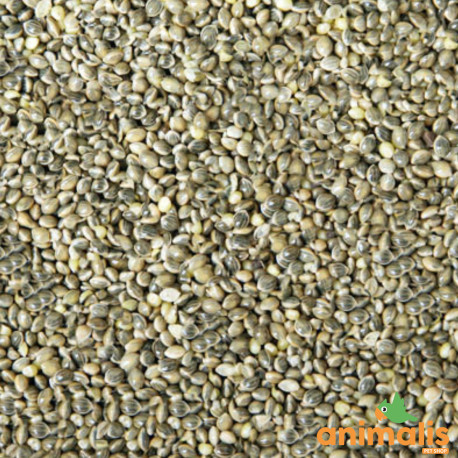- In the process of being restocked




Reference: 167803-1KG
They have the property of binding to minerals such as calcium, iron and zinc and making them less bioavailable.
They have the property of binding to minerals such as calcium, iron and zinc and making them less bioavailable.
Millet is used in the diet of all birds: straight beaks and hooked beaks. In bunches, it's a treat they love.
Cluster millet has a good protein and carbohydrate content and also contains a large number of amino acids. Ideal for distracting your birds and thus avoiding pecking (feather pulling).
Aleppo pine seeds (large) for parakeets, parrots, crossbills... is a natural pine seed, a delight for your birds, this seed also has therapeutic virtues, it can be added to the seed mixture or in a separate feeder.
Chenopodium quinoa is an annual plant, one to two meters tall or more. The central stem is cylindrical at the collar and becomes more angular higher. It can be unique or have many ramifications, with a diameter ranging from one to eight centimeters and a height of 0.5 to 3 m, depending on the varieties and growing conditions such as seeding density or fertilization9. Its color is also very variable: uniformly green, green with purple or red streaks, or uniformly red.
Foniopaddy Seed is a natural grass seed grown on our plantations in Uganda. Scientific research has shown that Foniopaddy has a beneficial effect on coccidiosis.
A 100% natural product that is mixed with breeding or with food; It doubles in size by adding water.
Carrots are very rich in vitamins with a high proportion of vitamin A and carotene, as well as vitamin B, calcium and valuable carbohydrates.
Foniopaddy Seed is a natural grass seed grown on our plantations in Uganda. Scientific research has shown that Foniopaddy has a beneficial effect on coccidiosis.
Soybeans are an excellent source of iron, zinc, manganese, copper, selenium, potassium, vitamins, fiber, polyunsaturated fatty acids and antioxidants, in short, it is an excellent dietary supplement.
Soybeans are often used in sprouting seed mixes.
Striated sunflower is the basic seed of any parrot mixture. It is also used in mixtures for parakeets and exotic doves.
It is also the favorite food of your outdoor birds during the winter period! Ideal for feeding the birds in your garden.
Practical information for giving sunflower seeds to birds in your garden:
Remember to regularly clean the feeders of your outdoor birds so that diseases and bacteria do not thrive.
Also consider setting feeders high up to prevent predators (such as cats, foxes, etc.) from targeting birds when they are eating.
Clover stimulates the immune system and slows down cellular ageing through its excellent antioxidant properties. Rich in vitamins B, C, E and provitamin A.
Premium high-quality, high-fat seeds
- With a high content of vitamin E, B9, B5, B6, B1, B2, B3 and vitamin K.
- It has antioxidant properties.
- Excellent energy contribution.
- Rich in calcium, potassium, magnesium, phosphorus, protein, zinc, thiamine, pectin (cleanses the body).
Spinach seeds contain vitamins A, B1, B2, B3, B7, B9 and C, mineral salts and trace elements. Regular consumption helps to strengthen the feathers.

They have the property of binding to minerals such as calcium, iron and zinc and making them less bioavailable.
